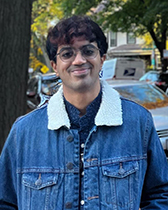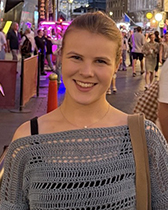Franke Fellows 2025-2026
(Scroll down the page for Franke Undergraduate Fellows)
Franke Graduate Fellows
Franke Graduate Fellowships, supported by generous funding from Richard and Barbara Franke and The Graduate School (TGS), bring together four outstanding doctoral students in the humanities to cultivate their research and teaching in the interdisciplinary setting of the Kaplan Institute. Franke Graduate Fellows devote two quarters, full time, to shaping their projects during fall and winter. They also receive pedagogical mentoring in developing an undergraduate course that they teach in their home departments in the spring, and present their research at the Future Directions Forum in spring 2026.
 Clara Wenrong Lee
Clara Wenrong Lee
Department of Performance Studies; Certificate in Critical Theory
Project: Thickening the Plot: Unruly Racial Formations
Thickening the Plot turns to the histories of cultivation—including botany, agriculture, and landscaping—as fecund sites for tracing the co-constitutive materialization of race, sex, and gender. It situates the colonial plantation as both the living laboratories from which the modern racial regime was consolidated and overlooked terrains for mapping wayward, unruly, experimental notions of racial aesthetics, affects, and embodiments that exceed as well as elude the more conventional understandings of the historical-racial schema.
 Ishan Mehandru
Ishan Mehandru
Program in Comparative Literary Studies (Home department: Asian Languages and Cultures)
Project: Dispersed Relations: Caste, Communalism, and Women Writers in South Asia
"My project argues that the ruse of a secular nation-state represses inequalities of gender, caste, and religion in postcolonial South Asia. Turning to a set of women writers across the Hindi, Urdu, Punjabi, and Anglophone public spheres, I trace a literary counter-history that challenges fantasies of syncretic and constitutional assimilation. These writers reimagine solidarity through 'dispersed relations,' relinquishing the desire for a shared community by foregrounding a poetics of unfulfilled love and friendship."
 Sofía Sánchez
Sofía Sánchez
Department of Spanish and Portuguese; Mellon Interdisciplinary Cluster Fellow in Theatre and Performance
Project: Dramaturgies of Reparation: Community-Based Theater and Restorative Justice in Colombia
This project explores the reparative potential of Colombian grassroots theater organizations to demonstrate that their performances serve as practices of reparation and reintegration for survivors of violence and former offenders. Through the concept of "Dramaturgies of reparation," it argues that traumatic experiences of violence, expressed through dramaturgical exercises, allow communities to reinvent themselves as political actors, reconfigure their experiences, renegotiate their place in the public sphere, and thus conceptualize reparation and peacebuilding in novel ways.
 Michael Slattery
Michael Slattery
Program in Music Theory and Cognition, Department of Music Studies; Critical Theory Cluster
Project: The Heavens Are Telling: Cultural Meanings of the Do-Re-Mi
"My project investigates recurring musical patterns as sites of communication as well as units of structure. I examine one brief musical pattern, the Do-Re-Mi, in the works of Haydn, Beethoven, and Bruckner. By positioning the use and reception of the Do-Re-Mi in its 18th and 19th century contexts, I understand its musical ascent as signifying a rich network of meanings that includes sunrise, the sublime, and religious devotion."
FRANKE underGRADUATE FELLOWS
Franke Undergraduate Fellows develop their independent research projects within the Kaplan Institute; receive mentorship in fall and winter through the Senior Humanities Seminar, taught by Rebecca Seligman (Associate Professor of Anthropology); and present their work at the Future Directions Forum in spring 2026.
 Jacob Currey
Jacob Currey
School of Professional Studies
Project: Failing Reentry: Analyzing IDOC’s Noncompliance with Legal Reentry Obligations and Its Impact on Recidivism
“My project investigates how the Illinois Department of Corrections (IDOC) fulfills its legal obligations to support individuals returning to society after incarceration. By analyzing state laws, court cases, and IDOC policies alongside interviews with formerly incarcerated individuals, I explore gaps between policy and practice in reentry services. This work illuminates competing views of punishment, rehabilitation versus retribution, and how these views shape reentry practices and ultimately impact human dignity. The research highlights these shortcomings and offers policy recommendations to reduce recidivism and promote successful reintegration.”
 Emma DeRose
Emma DeRose
Department of History
Project: Daughter of the Sea, Liberty’s Heir: Towards a Historical Contextualization and Interpretation of Mary Antin’s The Promised Land (1912) as a Progressive Era Text
"Mary Antin was one of the most prominent public intellectuals of the early 20th century. Her autobiography, The Promised Land (TPL; 1912), became an instant national bestseller—detailing Antin’s journey towards Americanization as a Russian-Jewish immigrant. Antin hoped her story of Americanization would encourage WASP Americans to advocate for unrestricted immigration to the U.S. Thus, TPL was ahead of its time—preaching liberty and refuge just as many intensified advocating for America’s gates to close. However, these significant political and historical dimensions are rarely explored in studies of TPL, which are primarily geared towards exploring the Judaic facets of Antin’s work. My project seeks to revive these dimensions, exploring Mary Antin’s philosophical, contextual, and personal influences in order to illuminate the potency of TPL’s message during the turn of the century."
 Yong-Yu Huang
Yong-Yu Huang
Departments of English and Computer Science
Project: “Where we shouldn't be”: Migration and Interior Worlds in Naipaul and Ondaatje
“My project explores how postcolonial authors V. S. Naipaul and Michael Ondaatje depict migration and alienation through journeys shaped by colonial influences and cosmopolitanism. As characters arrive at the fading heart of empire and move through war-torn borderlands and transient spaces, my research will attend to both geopolitical forces and emotional narratives. By combining literary analysis with historical and political perspectives, I aim to show how their narratives reveal the fragility of a globalizing world and the tolls of dislocation.”
 Walter Todd
Walter Todd
Department of Theatre
Project: In the Eye of Another: Critiquing Neoliberal Constructs of Identity Through Drama
“My project involves the production of a new, full-length play titled Another which confronts one of society's current dominant ideologies: neoliberalism. I am doing a dual-pronged investigation into the humanities (researching theoretical interventions native to non-binary studies, transfeminism, and abolitionist thought) and drama (researching trans drama and Brechtian 'Epic Theatre') to produce a script which interrogates the role that gender, race, and class play within the reward systems that perpetuate neoliberalism.”
 Ella Waffner
Ella Waffner
Departments of Theatre and English
Project: Wicked Words: Witchcraft Speech as Political Speech in Renaissance Drama
"In my research, I hope to examine how witchcraft language is used in Renaissance plays to regulate female political speech and chastity. I am specifically interested in implicit witchcraft tragedies, plays wherein this language operates metaphorically, coding characters as witches in plays where magic doesn’t (or shouldn’t) hold literal power. Pairing these plays with conduct books and witch pamphlets, I will investigate the parallel between political protest speech and casting a 'curse'."
